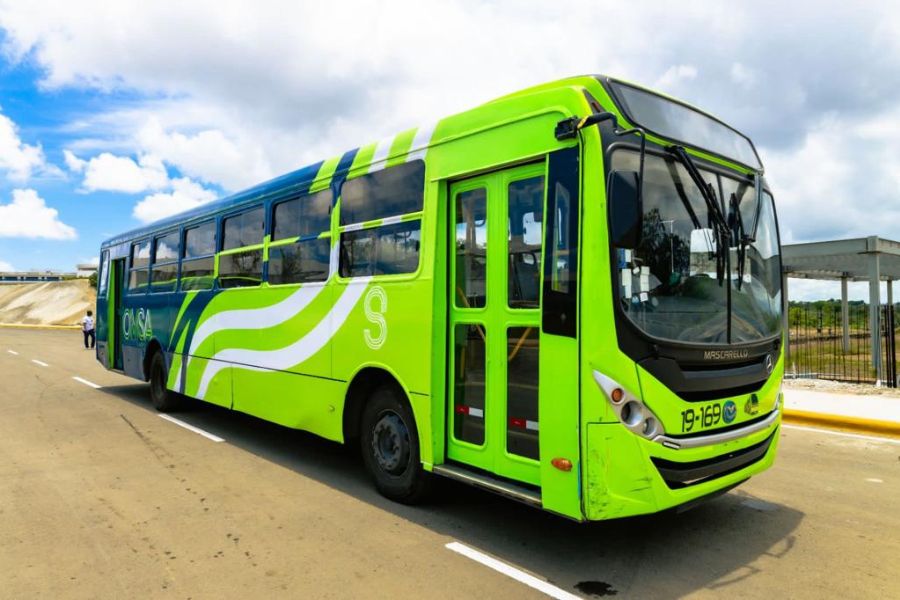The Dominican Republic government is carrying out a programme in collaboration with Euroclima, aiming to create an enabling framework for the incorporation of electric buses in the country’s capital.
As a result of this initiative, three consultancy projects were carried out, each with a different line of action, including forest risk management, sustainable mobility, and public fleet acquisition strategies.
Luz Alcántara, in charge of the mitigation department at the National Council for Climate Change, speaking with Mobility Portal Latin America, states: “This is a design process that seeks to establish a strategy and develop a pilot project for the implementation of 130 electric buses.”
It is important to note that the number of units to be incorporated is an estimate that will align with the overall mobility plan and public transport strategy in Santo Domingo in the future.
The approximate figure was determined considering both the current capacity and demand of the transport system, as well as the available infrastructure and electric charging capacity in the city.
However, despite the progress, the date to start its implementation is still undefined.
“First, we move forward with the creation of enabling frameworks, where information is required, to then begin the implementation,” assures Pamela Abreu, mitigation analyst at the National Council for Climate Change.
It is worth recalling that the first phase of the programme started in May 2023 and ended in March 2024.
The second stage is scheduled to start around June 2024 and would initially last for 24 months.
Some data collected in the consultancy to incorporate eBuses
According to the consultancy carried out by Evectra, the main objective of this activity is to optimise vehicle maintenance procedures, considering both workshop training and the potential outsourcing of these functions.
The aim is to get rid of buses in poor condition and not in operation to free up space in the yards, thus facilitating a smoother transition to an electric fleet and efficient charging infrastructure.
To address this task effectively, it is crucial to consider the current characteristics of the OMSA service in Santo Domingo.
Similarly, operational details indicated in the consultancy with the Municipal Transport Company of Madrid (EMT) have come to light.
Based on EMT’s experience, the vehicles’ autonomy should be sufficient to meet the maximum number of service hours without the need for intermediate charging, which is 16 hours. This assumes that the units leave with a fully charged battery.
Furthermore, for daytime recharges, a time interval of 10 hours is established, from around 9 am to 7 pm, to optimise charging using solar energy.
Charging in the yard is done in a minimum time of 180 minutes, with a maximum of 12 minutes for the “plug-in and drop-off” process.
Regarding the funding of the programme, initially, the State would be responsible for acquiring the first electric buses, possibly with financing from the World Bank or other sources offering soft loans.
However, the purchase of buses is not the only aspect considered. The most suitable corridors for the implementation of these units are also being analysed.
Likewise, the project results related to charging stations are being discussed to determine their compatibility with the overall plan. They are still in the analysis and evaluation phase, according to Luz.
Another important aspect of this initiative is to determine which buses will be replaced, as not all fleets will be completely changed.
The reality is that it does not make sense to replace vehicles that are still in operation and have a useful life, such as those acquired between 2015 and 2020.
Therefore, the focus should be on replacing buses that have already served their purpose and are out of service, explains Luz Alcántara.
She adds, “The goal is for the new buses to be electric or, at least, hybrid, as it is recognised that you cannot transition abruptly from an obsolete technology to a completely modern one.”
In relation to this, another institution interested in this programme is the Metropolitan Bus Services Office (OMSA).
They are also involved in this consultancy, as it is important to finalise their plan to incorporate electric buses into their fleet.
This is affirmed by Hugo Beras, head of the National Land Transport Institute (INTRANT), while he specifies that they are analysing the properties owned by the entity to install a charging yard.
“A renewal of the entire bus service fleet will be carried out,” Beras indicates.
He adds, “Between 200 and 300 buses will be concentrated in a charging yard, and processes are being undertaken to advance in the structure.”
The spaces under study are located in Santo Domingo and Santiago.
To learn more about electromobility in Latin America, visit Mobility Portal Latinoamérica.







